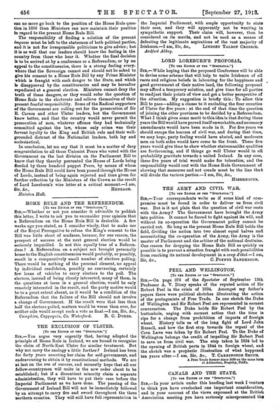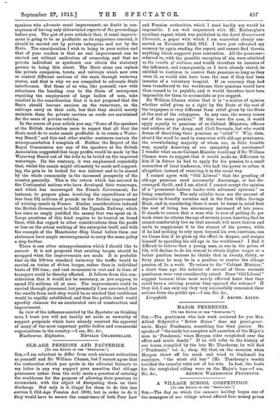CANALS AND THE SPATS.
[To TES EDITOR 07 1112 ..srEcTeron.1 SIR,—In your article under this heading last week I venture to think you have overlooked one important consideration, and in your account of the views expressed at the British Association meeting you have seriously misrepresented the
speakers who advocate canal improvement, no doubt in con- sequence of having only abbreviated reports of the proceedings before you. The gist of your article is that, if canal improve- ment is going to be as profitable as its supporters contend, it should be carried out by private enterprise and not by the State. The consideration I wish to bring to your notice and that of your readers is that no real improvement can be carried out without unification of ownership, and that no private individual or syndicate can obtain the statutory powers to bring this about. The State alone can replace the private companies, trusts, and railways which now own or control different sections of the main through waterway routes, and that is why we are compelled to advocate State interference. But those of us who, like yourself, view with reluctance the handing over to the State of enterprises requiring the employment of large bodies of men, take comfort in the consideration that it is not proposed that the State should become carriers on the waterways, as the railways carry on their rails, but that they should merely maintain them for private carriers as roads are maintained for the users of private vehicles.
In the course of your article you say, "Some of the speakers at the British Association seem to expect that all that the State need do to make canals profitable is to create a Water- way Board," and this and other similar sentences contain the misrepresentation I complain of. Neither the Report of the Royal Commission nor any of the speakers at the British Association suggested that large profits would be made by the Waterway Board out of the tolls to be levied on the improved waterways. On the contrary, it was emphasized repeatedly that, whilst the canals might ultimately be made self-support- ing, the gain to be looked for was indirect and to be shared by the whole community in the increased prosperity of the country generally. This is the return which has accrued to the Continental nations who have developed their waterways, and which has encouraged the French Government, for instance, to prepare plans involving the expenditure of no less than 234 millions of pounds on the further improvement of existing canals in France. Similar considerations induced the British Government to build the Uganda Railway, which has since so amply justified the money that was spent on it. Large questions of this kind require to be treated on broad 'lines, with due regard to other considerations than the profit or loss on the actual working of the enterprise itself, and with the example of the Manchester Ship Canal before them our statesmen have ample encouragement to carry the same policy a step further.
There is one other misapprehension which I should like to correct. It is not proposed that existing barges should be scrapped when the improvements are made. It is probable that on the 100-ton standard waterway the traffic would be carried on trains of 40-ton barges, rather than in individual boats of 100 tons; and vast economies in cost and in time of transport could be thereby effected. It follows from this con- sideration that it would not be necessary, as you suppose, to spend 174 millions all at once. The improvements could be carried through piecemeal, but personally I am convinced that the results from each step would be so marked that confidence would be rapidly established, and that the public itself would speedily clamour for an accelerated rate of construction and improvement.
In view of the influence exerted by the Spectator on thinking men, I trust you will not hastily set aside as unworthy of support proposals which have already received the approval of many of the most important public bodies and commercial organizations in the country.—I am, Sir, &c.,











































 Previous page
Previous page